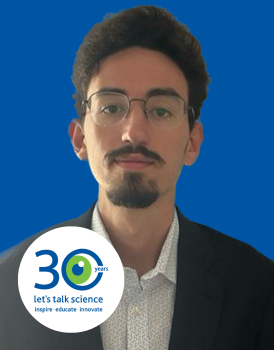Alexander Vicol, a current Schulich Leader at McMaster University, began competing in the Let’s Talk Science Challenge in the seventh grade. “It was a phenomenal experience,” says Vicol, recalling many fond memories of the Challenge, from pulse pudding engineering challenges to unlikely quiz victories. One particular triumphant moment for Vicol involved the little-known element, Oganesson (then known as Ununoctium). “During the competition, one of the questions asked: what is the name of the element with 118 protons? And nobody on our team knew,” Vicol recalls. “Since I was the person who specialized in chemistry, I was supposed to know the answer to that question, but I really didn’t know, so I just gave a random guess.” Vicol was shocked when his random answer turned out to be correct. “I was ecstatic. I started yelling. It was super socially unacceptable,” Vicol laughs. “My whole team was so happy! It was actually great.”

For Vicol, the Challenge wasn’t just somewhere to study science but also a chance to put it into practice. “During the engineering challenge, we had to create a mechanism that could pick up a marshmallow off the ground using popsicle sticks and tape,” recalls Vicol. “It seemed so easy at first, but once we started, it was quite difficult!” With some cooperation and a lot of laughter, Vicol’s team was able to use their knowledge and teamwork to lift the marshmallow at the very last second. “We were laughing all the way! But we were also applying what we had learned, cooperating, and practicing intuitive thinking.”
Vicol stresses the importance of the Let’s Talk Science Challenge as an outlet for students seeking extracurricular and enriching experiences in STEM. “I really like that the Let’s Talk Science Challenge exists because it not only provides students the chance to study subjects such as chemistry, biology, and physics in-depth, but also incorporates things like collaboration, project management and teamwork.” Vicol felt the impact of his time competing at Let’s Talk Science as he progressed through his schooling. “There was a very subtle impact that actually turned out to be quite important over the years,” says Vicol. “The Challenge taught me snippets of important information in a way that a seventh or eighth-grader could learn quite easily. For example, the speed of light is 299,792,458 metres per second, which is a fact I’ve known since the seventh grade because of the Let’s Talk Science Challenge.” These little bits of knowledge helped Vicol as he progressed through secondary school, giving him an advantage on difficult topics. “It wasn’t the first time I was seeing these topics. My prior exposure allowed me to have the confidence and time to appreciate and fall in love with the subjects.”
Nowadays, Vicol keeps busy studying at McMaster and running the club he founded, McMaster Advanced Space Systems. “We’re currently working with the Canadian Space Agency on two different projects,” says Vicol of the club. “For one, we’re sending a payload 37 kilometres up into the sky via a high-altitude balloon. And for the other, we’re trying to design and build a constructible radio telescope and then test it in Northern Quebec, which should be really cool.” In addition to these projects, the club is also collaborating with SNOLAB, a state-of-the-art, Nobel Prize winning, research laboratory focused on the study of dark matter and neutrinos, located two kilometres underground at Vale’s Creighton mine near Sudbury, Ontario.
In addition to his work in mathematics and physics, Vicol has found a recent passion for neurobiology. “Studying science and math is like looking into the window of truth and seeing how the universe operates: the laws that it follows, the tendencies that it has, how it all comes together to produce the world in which I live,” considers Vicol. “But recently, I’ve found that not only am I trying to understand how the universe works, but also trying to understand the thing that is analyzing the universe works: the brain.” While the shift to biology has been a pivot from his previous study of mathematics and physics, Vicol is excited to see where this new field can take him.
Even with his Let’s Talk Science Challenge days far behind him, he still feels the influence: “In the Challenge, I competed in chemistry and physics—mainly physics,” recalls Vicol. “And funnily enough, in university, guess what I majored in in my first year? Chemical and physical sciences.” Vicol believes that STEM programming is important for opening doors and providing new opportunities to students. “Students, especially at a young age, are very open to new experiences and learning,” he says. “STEM programming is extremely important for students to figure out what they’re passionate about and what they’re good at.”